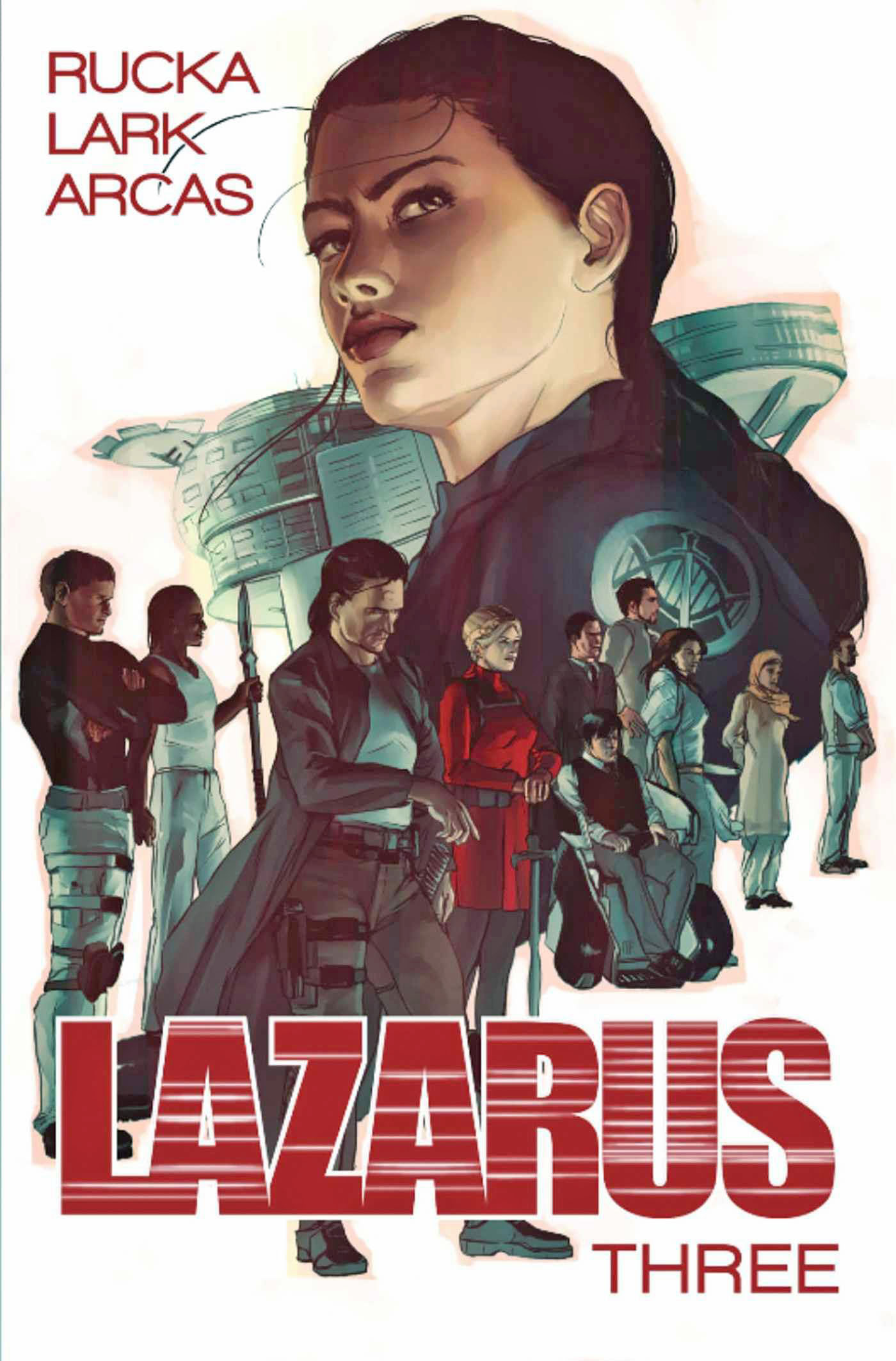Yes, I know we never posted a review of Book 2 of Greg Rucka’s Lazarus graphic novel series. It’s an excellent book, you really should read it, but we can skip it for the purposes of Book 3, because it focuses on one of the many desperately poor families in this dystopian future, with the titular Lazarus character mostly in the background. When we get back to Forever Carlyle in Book 3, she’s still reeling from the anonymous text she received at the end of Book 1.
HE IS NOT YOUR FATHER.
THIS IS NOT YOUR FAMILY.
First though, we have to jump back four months into the past to see what Jonah Carlyle has been up to. You remember Jonah, right? Rich douchebag and narcissist? Plotting with his twin sister Johanna (who he has a VERY unsibling-like relationship with) to murder their father and their Lazari-sibling Forever? Forced to flee from the Carlyle compound after Johanna set him up to take the fall for their plotting and (though he doesn’t know it yet) the severe beating that Johanna made her servant give her to remove herself as a suspect? Oh yes, Jonah may be capable of betraying his family, but he’s learning that’s nothing compared to the lengths Johanna will go to in order to get what she wants.
Jonah learns a lot of things in this book, and top of the list is the fact that he isn’t important for what he does, or what he knows, but what he is. Each of the sixteen families ruling the Earth has a different specialty in technology and/or medicine, and Carlyle’s specialty is grain production. Oh, and genetic tinkering that allows anyone to live forever, zero aging. Jonah’s DNA may hold the key to a very closely-kept secret, so when he’s taken prisoner by a Family who might be able to crack the code, it means a Conclave has to be held to try to stop a war between the Families
The Families continue to live like Bond villains here. The location of the Conclave is a freestanding facility owned by the Armitage family in the middle of the North Sea, complete with luxury accommodations and a ballroom. Each of the Families have their own methods for iron-fisted control of their populations (ex: Carlyle uses their armed forces to keep everyone separated into the standard “Serfs” and please-starve-to-death-quieter “Waste”, while Hock seems to prefer giving the people mandatory doses of pharmaceuticals and propaganda). And even though everyone has access to advanced weaponry, their preferred weapons of choice are sword-wielding Lazarai: family members who have been trained and upgraded with everything from cybernetic implants to Forever’s genetic modifications that repair any injury, including death (we see Forever punch a tile wall in a private rage, and then watch as the damage to her fist heals instantly. From the look on her face, this isn’t comforting.)
The interactions between the Lazarai from the different families have become my favorite parts of the series. In public they’re courteous and professional to each other. Privately is a completely different story. In one chapter Forever is exercising in the Armitage Facility’s gym, and Bittner Family’s Lazarus, Sonja, asks if Forever wants to join her workout. The artwork shows that Forever’s smile isn’t just friendly, it’s genuinely warm, even delighted. When Nikosi Family’s Lazarus Xolani joins them, the three are soon engaged in a complicated three-way sparring exercise, while casually chatting about a poker game that will be taking place that night, and maybe a little good-natured flirting.
It’s not that all of the Lazari are friends (the aforementioned poker game features a nasty accusation of cheating, followed by a polite but effective variation of “say you’re sorry or I’ll give you something to really be embarrassed about” response) but there’s a real camaraderie (and in the case of Forever and the Morray Lazarus Joacquim, quite a bit more) between these soldiers that are set apart from “normal” family members. They may be important to their Family (all that time and money spent on upgrades and training), but they’re not entirely considered people. They’re weapons to be thrown onto a battlefield or pitched in single combat against each other, friendships be damned.

The artwork in this series continues to be excellent. The style looks like almost careless splashes of ink, but it’s surprisingly intricate, conveying flickers of emotion like a sulky apology, or shyness at a first kiss, or embarrassment at being an unkillable warrior who has to wear an evening gown. The artwork is equally effective at showing a couple alone on a ballroom floor, or a full seven pages of a brutal swordfight, no dialog, no sound effects, just blood spatters and bone-jarring impacts. If there’s anything that sums up how Forever’s family really feels about her, it’s the image of her sister Bethany holding a martini glass like she’s at a cocktail party while watching as Forever and another Lazarus try to carve each other into pieces.
Forever doesn’t get quite the learning experience that Jonah gets in this book, but she’s starting to question her role in the Carlyle family, and even her own identity, going so far as to ask “Am I a Carlyle”. Her sibling’s “oh of course you are, why do you ask?” isn’t any more convincing than Forever’s “ha ha, no reason”. And she’s made at least a couple of decisions that might put her at odds with her father and the rest of the family at the very worst time, right before an all-out war gets started.